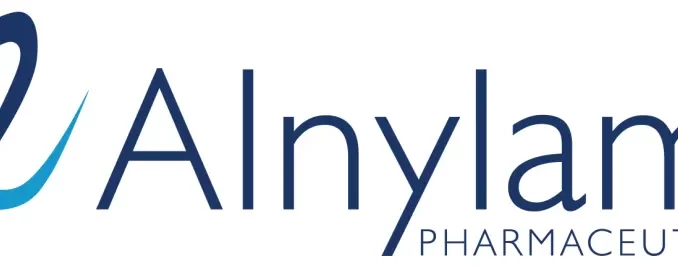
− Achieved 28% and 33% Reduction in Composite of All-Cause Mortality and Recurrent Cardiovascular Events in the Overall and Monotherapy Populations, Respectively –
− Reduced All-Cause Mortality by 36% and 35% in the Overall and Monotherapy Populations, Respectively, in a Pre-Specified Secondary Endpoint –
− Demonstrated Clinically Significant Benefits on 6-Minute Walk Test, Kansas City Cardiomyopathy Questionnaire and NYHA Class – Key Measures of Disease Progression –
− Observed Consistent Effects in All Key Subgroups, Including Baseline Tafamidis –
− Demonstrated Encouraging Safety, Consistent with Established Profile –
− Alnylam to File a U.S. Supplemental New Drug Application Using a Priority Review Voucher –
− Alnylam to Host Conference Call Today at 8:00 am ET –
CAMBRIDGE, Mass., June 24, 2024—-Alnylam Pharmaceuticals, Inc. (Nasdaq: ALNY), the leading RNAi therapeutics company, today announced positive topline results from its HELIOS-B Phase 3 study of vutrisiran, an investigational RNAi therapeutic in development for the treatment of ATTR amyloidosis with cardiomyopathy (ATTR-CM).
The study met the primary endpoint, demonstrating a statistically significant reduction in the composite of all-cause mortality and recurrent cardiovascular (CV) events during the double-blind period in both the overall population (HR 0.718, p-value 0.0118; n=654) and in the monotherapy population (patients not receiving tafamidis at baseline; HR 0.672, p-value 0.0162; n=395).
The study also demonstrated statistically significant improvements across all secondary endpoints in both the overall and monotherapy populations. This includes key measures of disease progression: 6-minute walk test (6-MWT), Kansas City Cardiomyopathy Questionnaire (KCCQ) and New York Heart Association (NYHA) Class at Month 30 (p<0.025 for all). Importantly, treatment with vutrisiran also reduced all-cause mortality in the overall population (HR 0.645, p<0.025) and in the monotherapy population (HR 0.655, p<0.05) up to Month 42. This was a pre-specified, intent-to-treat analysis that included up to six months of data from the open-label extension.
“I’m thrilled by these overwhelmingly positive data from the HELIOS-B study, which suggest that vutrisiran has the potential to address the needs of patients with ATTR amyloidosis with cardiomyopathy, a steadily progressive, debilitating, and ultimately fatal disease,” said Pushkal Garg, M.D., Chief Medical Officer of Alnylam. “The results showed that vutrisiran improved cardiovascular outcomes, including survival, function and quality of life in all patient groups with ATTR cardiomyopathy. We are moving with urgency to file these compelling data with regulators to bring this medicine to patients around the world.”
In addition, vutrisiran demonstrated consistent effects on the primary composite endpoint and all secondary endpoints across all key subgroups, including baseline tafamidis use, ATTR disease type and measures of disease severity.
In the HELIOS-B study, vutrisiran demonstrated encouraging safety and tolerability, consistent with its established profile. Rates of adverse events (AEs), serious AEs and AEs leading to study drug discontinuation were similar between the vutrisiran and placebo arms. No AEs were seen ≥3% more frequently in the vutrisiran arm compared to the placebo arm.
“I am overjoyed by the results of the HELIOS-B study, which suggest the potential for vutrisiran to be a transformative medicine for patients with ATTR amyloidosis with cardiomyopathy,” said Yvonne Greenstreet, MBChB, Chief Executive Officer of Alnylam. “Assuming favorable regulatory review, vutrisiran has the potential to become the new standard of care for the treatment of this disease, driving Alnylam’s next era of substantial growth.”
HELIOS-B (NCT: NCT04153149) is a Phase 3, randomized, double-blind, placebo-controlled multicenter global study designed and powered to evaluate the efficacy and safety of vutrisiran on the reduction of all-cause mortality and recurrent cardiovascular events as a primary composite endpoint in patients with ATTR amyloidosis with cardiomyopathy in the overall and monotherapy populations. The study randomized 655 adult patients with ATTR amyloidosis (hereditary or wild-type) with cardiomyopathy. Patients were randomized 1:1 to receive vutrisiran 25mg or placebo subcutaneously once every three months during a double-blind treatment period of up to 36 months. After the double-blind period, all eligible patients remaining on the study may receive vutrisiran in an open-label extension period.
Detailed results from the HELIOS-B study have been submitted as a late-breaking abstract to the European Society of Cardiology for presentation. The Company plans to proceed with global regulatory submissions starting later this year, including filing a supplemental New Drug Application with the U.S. Food and Drug Administration using a Priority Review Voucher.
Investor Webcast Information
Management will discuss the HELIOS-B topline results via conference call on Monday, June 24, 2024, at 8:00 am ET. To access the call, please register online at https://register.vevent.com/register/BId4cad1b9b91f4f41a7907f0222ed55c7. Participants are requested to register at a minimum of 15 minutes before the start of the call. A replay of the call will be available two hours after the call and archived on the same web page for six months.
A live audio webcast of the call will be available on the Investors section of the Company’s website at www.alnylam.com/events. An archived webcast will be available on the Company’s website approximately two hours after the event.
IMPORTANT SAFETY INFORMATION
Reduced Serum Vitamin A Levels and Recommended Supplementation
AMVUTTRA® (vutrisiran) treatment leads to a decrease in serum vitamin A levels. Supplementation at the recommended daily allowance (RDA) of vitamin A is advised for patients taking AMVUTTRA. Higher doses than the RDA should not be given to try to achieve normal serum vitamin A levels during treatment with AMVUTTRA, as serum vitamin A levels do not reflect the total vitamin A in the body.
Patients should be referred to an ophthalmologist if they develop ocular symptoms suggestive of vitamin A deficiency (e.g., night blindness).
Adverse Reactions
The most common adverse reactions that occurred in patients treated with AMVUTTRA for polyneuropathy of hereditary transthyretin-mediated amyloidosis (hATTR-PN) were arthralgia (11%), dyspnea (7%), and vitamin A decreased (7%).
For additional information about AMVUTTRA, please see the full Prescribing Information.
About ATTR
Transthyretin amyloidosis (ATTR) is an underdiagnosed, rapidly progressive, debilitating and fatal disease caused by misfolded transthyretin (TTR) proteins, which accumulate as amyloid deposits in various parts of the body, including the nerves, heart and gastrointestinal tract. Patients may present with polyneuropathy, cardiomyopathy, or both manifestations of disease. There are two different forms of ATTR – hereditary ATTR (hATTR), which is caused by a TTR gene variant and affects approximately 50,000 people worldwide, and wild-type ATTR (wtATTR), which occurs without a TTR gene variant and impacts an estimated 200,000 – 300,000 people worldwide.
About AMVUTTRA® (vutrisiran)
AMVUTTRA® (vutrisiran) is an RNAi therapeutic that delivers rapid knockdown of mutant and wild‑type transthyretin (TTR), addressing the underlying cause of transthyretin (ATTR) amyloidosis. Administered quarterly via subcutaneous injection, AMVUTTRA is approved and marketed in more than 15 countries for the treatment of the polyneuropathy of hereditary transthyretin-mediated amyloidosis (hATTR-PN) in adults. Vutrisiran is also in development for the treatment of ATTR amyloidosis with cardiomyopathy (ATTR-CM), which encompasses both wild-type and hereditary forms of the disease. For more information about AMVUTTRA, including the full U.S. Prescribing Information, visit AMVUTTRA.com.
About RNAi
RNAi (RNA interference) is a natural cellular process of gene silencing that represents one of the most promising and rapidly advancing frontiers in biology and drug development today. Its discovery has been heralded as “a major scientific breakthrough that happens once every decade or so,” and was recognized with the award of the 2006 Nobel Prize for Physiology or Medicine. By harnessing the natural biological process of RNAi occurring in our cells, a new class of medicines known as RNAi therapeutics is now a reality. Small interfering RNA (siRNA), the molecules that mediate RNAi and comprise Alnylam’s RNAi therapeutic platform, function upstream of today’s medicines by potently silencing messenger RNA (mRNA) – the genetic precursors that encode for disease-causing or disease pathway proteins – thus preventing them from being made. This is a revolutionary approach with the potential to transform the care of patients with genetic and other diseases.
About Alnylam Pharmaceuticals
Alnylam (Nasdaq: ALNY) has led the translation of RNA interference (RNAi) into a whole new class of innovative medicines with the potential to transform the lives of people afflicted with rare and prevalent diseases with unmet need. Based on Nobel Prize-winning science, RNAi therapeutics represent a powerful, clinically validated approach yielding transformative medicines. Since its founding in 2002, Alnylam has led the RNAi Revolution and continues to deliver on a bold vision to turn scientific possibility into reality. Alnylam’s commercial RNAi therapeutic products are ONPATTRO® (patisiran), AMVUTTRA® (vutrisiran), GIVLAARI® (givosiran), OXLUMO® (lumasiran), and Leqvio® (inclisiran), which is being developed and commercialized by Alnylam’s partner, Novartis. Alnylam has a deep pipeline of investigational medicines, including multiple product candidates that are in late-stage development. Alnylam is executing on its “Alnylam P5x25” strategy to deliver transformative medicines in both rare and common diseases benefiting patients around the world through sustainable innovation and exceptional financial performance, resulting in a leading biotech profile. Alnylam is headquartered in Cambridge, MA. For more information about our people, science and pipeline, please visit www.alnylam.com and engage with us on X (formerly Twitter) at @Alnylam, or on LinkedIn, Facebook, or Instagram.
